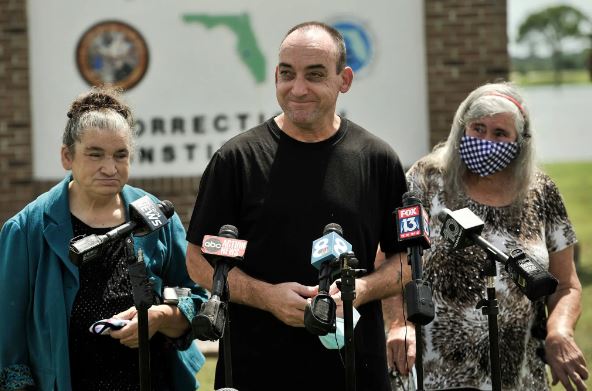After spending 37 years behind bars for a crime he did not commit, Robert DuBoise, now 59 years old, is set to receive a $14 million settlement from the City of Tampa. The settlement, approved unanimously by the Tampa City Council on Thursday, comes as a form of restitution for DuBoise’s wrongful conviction in the 1983 rape and murder of Barbara Grams, a 19-year-old woman.
DuBoise’s ordeal began when he was arrested at the age of 18 in connection with Grams’ killing. Following a one-week trial in 1985, he was convicted of first-degree murder and attempted sexual battery. Key evidence used against him included testimony from a jailhouse informant who claimed DuBoise’s guilt and the assertion by prosecutors that his teeth matched a bite mark found on the victim’s cheek. Initially sentenced to death, DuBoise’s punishment was later commuted to life in prison by the Florida Supreme Court.
In August 2020, DuBoise’s fortunes changed when new DNA evidence emerged, leading to his exoneration and implicating two other individuals in Grams’ murder. Subsequently freed from incarceration, DuBoise filed a federal lawsuit against the City of Tampa, four former police officers, and a forensic odontologist who had testified against him.
The settlement, to be paid in three installments over three years, marks a significant step towards closure for DuBoise, who expressed gratitude for the resolution of his case. Speaking about his experience, DuBoise voiced hope that his ordeal would serve as an example for others who have been wrongfully convicted, advocating for justice and reform within the criminal justice system.
The lawsuit filed by DuBoise alleged that the forensic odontologist, Dr. Richard Souviron, had fabricated bite mark evidence in collaboration with the police officers involved in the case. It claimed that the officers coerced informants to testify against DuBoise and conspired to manufacture false evidence, rather than diligently seeking the real perpetrator. However, Dr. Souviron denied these allegations, asserting that he had not falsified evidence or conspired with law enforcement officials.
Despite the settlement, the City of Tampa denied any intentional wrongdoing by the Tampa Police Department or its former officers. In depositions, the officers maintained that they had not coerced informants into providing false testimony against DuBoise. Additionally, the jail informant stated in his deposition that DuBoise had never confessed to the crime and that he had been pressured by officers to provide false testimony.
Reflecting on the case, Gayle Horn, DuBoise’s lawyer, criticized the continued reliance on what she termed “junk science” in the criminal justice system. She highlighted the persistent problem of prosecutors using flawed scientific evidence to secure convictions, underscoring the need for reform in the judicial process.
In response to the settlement, Chief Lee Bercaw of the Tampa Police Department emphasized advancements in investigative techniques and training aimed at ensuring greater accuracy and due process. While one of the four former police officers involved has since passed away, the others’ lawyer could not be reached for comment.
For DuBoise, the settlement represents not only a form of compensation for the years of wrongful imprisonment but also a vindication of his innocence. As he looks towards the future, he hopes that his case will prompt systemic changes in the criminal justice system, preventing others from enduring similar injustices.

